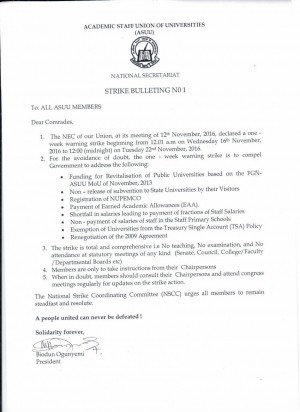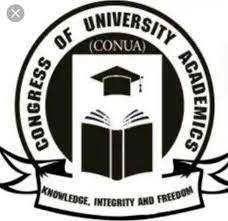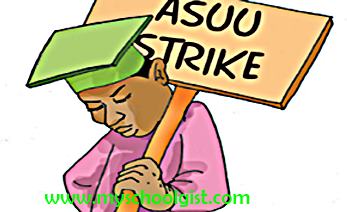
These are excerpts of the agreement between ASUU and federal government for a better understanding of the impasse.
Establishment of the Federal Government of Nigeria (FGN)/Academic Staff Union of Universities (ASUU) Re-Negotiation Committee
On Thursday, 14th December, 2006, the then Honourable Minister of Education, Dr. (Mrs.) Obiageli Ezekwesili, on behalf of the Federal Government of Nigeria (FGN), inaugurated the FGN/ASUU Re-negotiation Committee comprising the FGN Re-negotiation Team led by the then
Pro-Chancellor, University of Ibadan, Deacon Gamaliel O. Onosode, OFR,
and the ASUU Re-negotiation Team led by the then President of ASUU, Dr. Abdullahi Sule-Kano.
TERMS OF REFERENCE
The single Term of Reference of the Committee was to re-negotiate the 2001 FGN/ASUU Agreement and enter into a workable Agreement. In the course of discussion, the Committee agreed that the essence of the Re-negotiation was:
(i) To reverse the decay in the University System, in order to reposition it for greater responsibilities in national development;
(ii) To reverse the brain drain, not only by enhancing the remuneration of academic staff, but also by disengaging them from the encumbrances of a unified civil service wage structure;
(iii) To restore Nigerian Universities, through immediate, massive and sustained financial intervention; and,
(iv) To ensure genuine university autonomy and academic freedom.
1.3 COMPOSITION OF THE FGN/ASUU RE-NEGOTIATION COMMITTEE
The FGN/ASUU Re-negotiation Committee comprised the following Members, Advisers, Observers and the Joint Secretariat:
1.3.1 GOVERNMENT RE-NEGOTIATION TEAM
(a) Deacon Gamaliel O. Onosode, OFR Immediate PastTeam Leader & Pro-Chancellor, Chairman, Re-NegoUniversity of Ibadan. tiation Committee
(
b) Prof. Musa Abdullahi Secretary General Member (Deceased CVC & Immediate 30th October, 2008)
Past Pro-Chancellor, University of Jos
(c ) Prof. Greg Iwu, OONImmediate Past ProChancellor, Nnamdi Azikiwe University, Awka. Member
(
d) Rev. Father T. E. UwaifoImmediate Past Pro-Chancellor, Ambrose Alli University Ekpoma. Member
(e) Barrister Emeka Nwankpa Former Pro-Chancellor, Abia State University, Uturu. Member
(f) Amb. Muh. Adamu Jumba Immediate Past Pro-Chancellor, Bayero University, Kano. Member
(g) Prof. Mahmood. Yakubu Executive Secretary, ETF Member Abuja
(h) Senator Abdalla Wali Former Pro-Chancellor, University of Technology,
Yola Member (until 23rd February, 2008)
1.3.2 ASUU RE-NEGOTIATION TEAM
(a) Dr. Abdullahi Sule-Kano President Team Leader (until May 2008)
(b) Prof. Ukachukwu Awuzie President Team Leader
(from June, 2008) ( c) Dr. Oladipo FashinaMember
(d) Dr. Peter Ozo-Eson Member
(e) Dr. Ogban Ogban-Iyam Member
(f) Prof. Eskor Toyo Member
(g) Prof. Chukuka Okonjo Member
(h) Prof. Omotoye Olorode Member
(i) Dr. (Mrs) Nnenna N. OtiMember
(j) Prof. Olatunde Oduleye Member
(k) Dr. Biodun Onilude Member
(l) Prof. Idowu Awopetu Member
(m) Dr. Olugbenga Ogunbote Member
(n) Dr. Ralph Ofukwu Member
(o) Prof. Emmanuel Egia Okoegwale Member
(p) Prof. C. O. OrubuMember
(q) Dr. Nasir F. IsaMember ( r) Dr. Suleiman D. AbdulMember
(s) Dr. Festus Iyayi Member
And many others! There was a faculty of senior citizens as advisers and witness too!!
THE RESOLUTIONS AND AGREEMENTS..
Salary Structure for Academic Staff in Nigerian Universities
It was agreed that there shall be a separate Salary Structure for University Academic staff to be known as Consolidated University Academic Salary Structure II (CONUASS II), which is shown in Table 1. CONUASS II is made up of the following three components:
(a) The Consolidated Salary Structure for Academic Staff (CONUASS) approved by the Federal Government of Nigeria (FGN) effective 1st January 2007 (FGN Circular SWC/S/04/S.309/1, dated 18th January, 2007).
(b) Consolidated Peculiar University Academic Allowances (CONPUAA), exclusively for university teaching staff and derived from allowances not adequately reflected or not consolidated in CONUASS.
(c) Rent as approved by the FGN effective 1st January 2007 (FGN Circular SWC/S/04/S.309/1, dated 18th January, 2007).
Earned Academic Allowances
It was agreed that entitled academic staff shall be paid the following earned allowances at the rates indicated for undertaking the listed assignments.
Postgraduate Supervision Allowance
(i) Lecturer I N15,000 per student, per annum
(ii) Senior Lecturer N20,000 per student, per annum
(iii) Reader & Professor N25,000 per student, per annum
This allowance shall be paid to the entitled academic staff for a maximum of 5 students per annum.
b. Teaching Practice/Industrial Supervision/Field Trip Allowances
(i) Assistant Lecturer – Lecturer I N60,000 per annum
(ii) Senior Lecturer N80,000 per annum
(iii) Reader & Professor N100,000 per annum
Where the work involves travelling out of town, the usual mileage and night allowances shall be paid in line with the existing Government regulations. Also, where a staff is involved in more than one of the above activities in a given year, he or she shallbe remunerated separately for each activity.
c. Honoraria for External/Internal Examiner (Postgraduate Thesis)
External
(i) Master’s degree N80,000 per thesis
(ii) Doctorate degree N105,000 per thesis
Internal
(i) Master’s degree N45,000 per thesis
(ii) Doctorate degree N65,000 per thesis
Honoraria for External Moderation of Undergraduate and Postgraduate Examinations
(i) Undergraduate Up to 50 Candidates N60,000 more than 50 candidates N80,000
(ii) Postgraduate Up to 10 Candidates N60,000 more than 10 candidates N80,000
e. Postgraduate Study Grant
(i) Science based
Master’s degree N350,000 per session Doctorate degree N500,000 per session
(ii) Non-Science based
Master’s degree N250,000 per session Doctorate degree N350,000 per session
The above grant is to encourage young academics to obtain higher relevant qualification and remain on the job, provided that they do not exceed the normal years of the approved programmes i.e. Two (2) academic sessions for a Master degree, Four (4) academic sessions for a
Doctorate Degree programme.
f. External Assessment of Readers or Professors
In view of the critical nature of external assessment of candidates for Professorship and Readership positions in developing and sustaining the Universities, it was agreed that external assessors shall be paid a minimum allowance of N200, 000 per assessment for the position of Reader or Professor.
g.
Call Duty/Clinical Duty/Clinic Hazard
It was agreed that Call Duty/Clinical Duty/Clinical Hazard Allowance shall be paid to entitled academics as in the National Salaries, Incomes and Wages Commission (NSIWC) circular reference number SWC/S/04/S.309 of 18th
January, 2007 on approved Four Non-regular Allowances in the Public Service,
Responsibility Allowance
It was agreed that Responsibility Allowance shall be paid annually as follows:
i. Deputy Vice-Chancellor/Librarian N750,000
ii. Provost/Dean/Director N500,000
iii. Deputy/Vice/Associate Dean or Provost N350,000
iv. Head of Dept./Sub Dean N250,000
v. Fac./Dept Exam Officer N150,000
vi. Hall Warden N150,000
vii. All other Officers N150,000
j. Excess Workload Allowance
It was agreed that Excess Workload Allowance, which shall be phased out without delay, shall be paid only to entitled academic staff as follows:
i. Professor N3,500 per hour
ii. Reader N3,500 per hour
iii. Senior Lecturer N3,500 per hour
vi. Lecturer I N2,000 per hour
v. Lecturer II N2,000 per hour
vi. Assistant Lecturer N2,000 per hour
vii. Graduate Assistant N2,000 per hour
University administrators shall ensure that only those entitled are paid the allowance.
THE. CRUX OF THE MATTER
FUNDING
The Re-negotiation Committee, in order to arrive at the funding provisions stated below, took serious cognizance of the widely acknowledged fact that:
(i) The key to the survival of our country in the 21st Century lies in its ability
to produce applied and theoretical knowledge in science, technology and the humanities; and
(ii) The task of revitalizing and accelerating the development of the Nigerian University system to become internationally competitive can no longer be delayed, more so if Nigeria is to become a leading economy in the world within the next ten years or so as desired by the Government.
On the basis of the data collected, and their analysis through a rational and scientific procedure, the following funding requirements were projected for a quick and effective remedy of deficiencies in the programmes and facilities, and for a systematic upgrading of programmes and facilities that would rapidly advance Nigeria’s knowledge production for development. (The justification of the projected figures is i̶̲̥̅̊n̶̲̥̅̊
Appendix I “Funding Requirements for Revitalizing the Nigerian University System: 2009 -2011).
4.1 Funding of Universities
It was agreed to recommend that:
a)All regular Federal Universities shall require the sum of one trillion, five hundred and eighteen billion, three hundred and thirty-one million, five hundred and fortyfive thousand, three hundred and four naira (N1,518,331,545,304) only for the period
2009 -2011 as follows:
Year Amount (N)
2009 472,031,575,919
2010 497,531,778,701
2011 548,768,190,681
Total 1, 518, 331, 545, 304.
The agreement states further....
b.)Each State University shall require three million, six hundred and eighty thousand and eighteen Naira
(N3,680,018) per student for the period 2009 –2011 as follows:
Year Amount (N)
2009 1,144,075
2010 1,205,880
2011 1,330,063
Total (approximated) 3,680,000
These amounts include Recurrent and Capital Grants, and are based mainly on the disaggregated returns from the universities.
4.2 SOURCES OF FUNDING
4.2.1 Federal and State Governments
The goal of this negotiation is to put Nigeria in a strong position to become a knowledgebased society that will be able to compete and survive in the 21 st Century.
To achieve this, the entire education system requires massive funding at all levels. While non-budgetary sources have a role to play, and there must be continuous efforts to identify and use them prudently, the major source of funding education for national development is through budgetary allocation from State and Federal Governments.
With this in view, the Re-negotiation Committee agreed to recommend to the relevant authorities that:
(a)A minimum of 26% of the annual budget of the State and Federal Governments be allocated to education;
(b)At least 50% of the budgeted 26% shall be allocated to the universities; and,
(c)The representation of the Federal Ministry of Education to the Revenue Mobilisation and Fiscal Commission to put education on the “First Charge” be vigorously pursued.
(d)Being mindful of the processes for meeting this goal of 26% annual budgetary allocation to education as enunciated in the UNESCO benchmark, the Federal Government shall endeavour to progressively increase its budgetary allocation to the education sector in accordance with its vision 20:2020 programme.
4.2.2
Federal Government Assistance to States for Higher Education
It was agreed that the Federal Government should, as appropriate, provide general assistance both to the State Governments that are proprietors of universities and those that do not own universities but need assistance in the area of higher education, as allowed by the Nigerian Constitution (Section 164.1).
Let me pause here as you can peruse the terms of the agreement and adopt an informed view about the industrial action.
The questions are still begging for answers...
1) This agreement was signed by prof Onosode , pro-chancellor of unilag on behalf of the government and ASUU chairman, can the government claim ignorance of its financial obligation to this agreement while planning the budget?
2) If the country is not financially buoyant to foot this expenditure, what stops the minister of education from invoking the right of re-negotiation as provided in the agreement?
3) For the president to ask the reason for state uni to join the strike clearly smirks of his ignorance of the terms of this agreement.
4) Why did ASUU wait till 2013 to start this strike when they could have protested since the first installment ?
5) The NUC and representatives of ETF and PTDF on the boards were given the responsibility of notice and reminders to government, if na to donate 50million per university to bribe senators to increase allocation, that mumu NUC sec go sabi do?
SUMMARY
The government entered into an agreement out of ignorance or insincerity of honoring it!
We need a new, workable and practical agreement with all stake holders, a span of like 6 years and commitment by all the parties.
The minister of finance should be part of the committee to prevent another ''no money talk".
The students body should be joined as witness so that they are fully aware of the ineptitude of the government should they default.
And lastly, the president should be properly briefed on issues.




